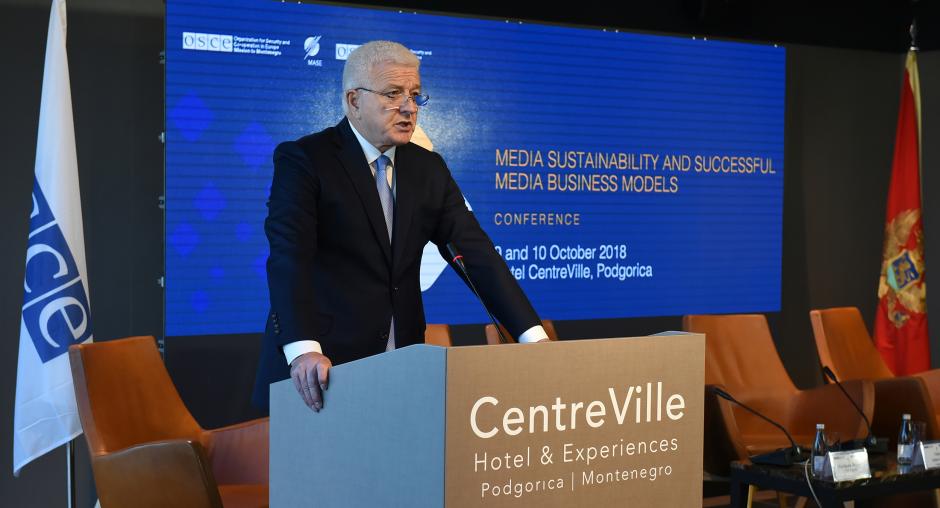Media sustainability and successful media business models in focus of OSCE conference in Podgorica

PODGORICA, 9 October 2018 – Business challenges and opportunities for the sustainability of traditional media, the importance of diversifying revenue streams and investing in quality journalism in the digital age, is the focus of a two-day conference, which opened today in Podgorica.
The conference, Media Sustainability and Successful Media Business Models, is organized by OSCE Mission to Montenegro and OSCE Mission to Skopje, in co-operation with the Media Association of South East Europe. It offers participants an in-depth overview of certain solutions that have successfully contributed to resolving important financial challenges for media outlets, thereby contributing to the sustainability of their operations.
OSCE Representative on Freedom of the Media Harlem Desir said that without the necessary investment, without sufficient revenues, without fair economic rules for the development of the media, we will have less and less media because of the disappearance of newspapers and of the difficulty to develop new media.
“It is crucial to ensure that the legal framework, the political climate towards the press, the safety of journalists and the economic environment is supportive of a pluralistic and quality media landscape in the region,” said Desir.
Montenegrin Prime Minster Duško Marković said that media freedom and the safety of journalists are not a condition for accession to the European Union. “It is about the moral and democratic obligation of Montenegro's authorities, which we will ultimately carry out, even if we never join the EU.”
Markovic also said that it is absolutely unacceptable to endanger the personal safety of journalists as a method for resolving misunderstandings and dissatisfaction over media reports.
Head of the OSCE Mission to Montenegro Maryse Daviet said that it is of paramount importance to open the dialogue on financial sustainability. “The OSCE is strongly supporting media outlets in their efforts toward achieving sustainable business models,” she said.
Head of the OSCE Mission to Skopje Clemens Koja said that in the digital age, print media face the challenge of sustaining themselves due to shifting revenue streams or an increased focus on online media. “With increased digitalization also come opportunities: Media outlets can offer content online, interact with media users in the digital sphere, and broaden reader bases.”
President of the Assembly of the Media Association of South East Europe, Željko Ivanović said that this conference marks the beginning of a new era in South-Eastern Europe, where the focus is on the sustainability of the media and less on media freedom. “The Government and its institutions create an environment in which media operate and this is one of the most important factors in media sustainability.”.
Representatives of international organizations and diplomatic missions, representatives from state institutions, media outlets and civil society organisations today discussed strategies for improving business operations of printed media in the digital era, mechanisms for cutting losses in media outlets through the prism of new media business concepts, the importance of media literacy in creating media content, as well as networking as a gate towards a successful media business.
The second day of the conference will be opened tomorrow by Montenegro’s Minister of Culture Aleksandar Bogdanović and will be dedicated to media regulatory practices and the growing influence of new media on the media market.
